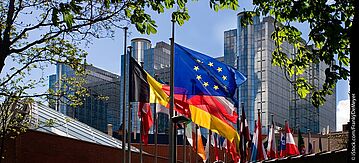European structural support for climate action and environmental protection

European cohesion policy, also referred to as regional or structural policy, aims to level differences in development status and living conditions in the various regions of Europe, thus strengthening economic, social and territorial cohesion across the EU. Core aspects are creating new jobs, strengthening competitiveness especially of small and medium-sized businesses, innovation, economic growth, sustainable development and improving the quality of life for European citizens. Structural support is a key instrument for EU economic and job policies; 351.8 billion euros, almost one third of the EU budget, is earmarked for this purpose for the period 2014 - 2020. There are three structural funds: The European Social Fund, the Cohesion Fund, which does not provides funds for Germany, and the European Regional Development Fund (ERDF), which is the focus here due to its particular importance for environmental protection and climate action in Germany
Climate action and environmental protection promote the modernisation of European economies through their positive effects on competitiveness, the job market and social cohesion. For this reason, a significant share of the structural fund - 137 billion euros - has been invested all over the EU in this financial period in measures of climate action, adaptation and the conservation of nature and resources. Cohesion policy provides support for all regions, depending on their development status. Globalisation, migration, poverty, need for innovation, climate change, environmental degradation and resource consumption are not limited to the less developed regions of the EU.
Investing in Germany with European funds for regional development
From 2014 to 2020, Germany has received around 10.8 billion euros from the European Regional Development Fund (ERDF). The Länder manage the funds from ERDF. They have earmarked 5.8 billion euros of EU funds to finance climate action, environmental protection, adaptation and risk prevention in their operational programmes, which define support targets and areas for the regions. Support is prioritised differently across the Länder depending on the regional needs. A large number of measures from a wide range of areas receive support, for example material and energy saving in production processes, energy-efficient upgrades to schools and child care facilities, the expansion of bicycle infrastructure and public transport, nature conservation measures to increase urban green spaces and the restoration of land and water bodies. EU legislation lays down that at least 20 percent of ERDF funds have to be used for investing in measures to reduce CO2 reductions in industry in the western Länder and the Leipzig region (developed regions) and 15 percent in the eastern Länder and Leipzig (transition regions). There is a broad offer of support instruments across all Länder for improving energy efficiency in businesses and buildings as well as other climate action measures. Depending on the programme, businesses, municipalities and other organisations such as environmental associations are eligible for ERDF support.
The following links will guide you to the ERDF programmes of the respective Land on the Internet, where you will find information on how to apply. TAURUS ECO CONSULTING was commissioned by UBA and BMU to draw up an EU compass for municipalities, which provides a good starting point to learn about European structural and investment funds as well as a planning aid for measures in the areas of environment, climate action and sustainable development.
Examples of ERDF support in the Länder
As part of an UBA project supported with funds from the BMU, the Nova Institute analyses selected support programmes and concepts of the Länder. The goal is to find effective approaches and instruments to implement the cross-sectoral goal of sustainable development. The ERDF also pursues this goal which, in short, determines that support has to be geared towards environmentally sound measures, including support areas that are not directly connected to environmental topics. The study also analyses good examples of implementing direct support for environmental issues that are model projects for content or implementation. An overview of these brief case studies is available here:
The Federal Ministry for Economic Affairs and Energy (BMWi) has the lead responsibility for European cohesion policies in the German government, and more information is available at the BMWi website.
As part of a project initiated by the UBA and funded by the BMU, WWF Germany has studied the sustainability of ERDF support and its contribution to implementing the Europe 2020 strategy for smart, sustainable and inclusive growth, competitiveness and productivity. The results, including two brochures on factors for the success of environmentally sound pro-gramme planning and concrete examples of climate action and environmental protection are presented here:
